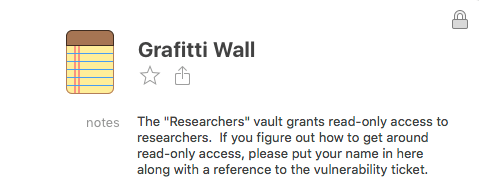We unequivocally encourage security researchers to poke around 1Password. It is an extremely important part of the process that helps us deliver and maintain a more secure product to everyone.
Finding and reporting potential security vulnerabilities is what we should all expect from bug hunters around the world; the hunters and yourself should expect that we address those vulnerabilities promptly. We have always welcomed security reports that arrive at security@agilebits.com, and over most of the past year we offered a more formal, invitation-only bug bounty program through Bugcrowd. We are pleased to now take that program public: https://bugcrowd.com/agilebits

Before I get into what the program offers, I’d like to remind you that there is always room to improve the security of any complicated system, 1Password included. As clever as we may think we are, there will be security issues that we miss and different perspectives help reveal them. Software updates that address security issues are part of a healthy product. This, by the way, is why it is important to always keep your systems and software up to date. Even in the complete (and unlikely) absence of software bugs, threats change over time, and defenses should try to stay ahead of the game.
Some words about Bounty
A bug bounty program offers payouts for different sorts of bugs. The first bug bounty that I recall seeing was Donald Knuth’s for the TeX typesetting system, though I have since learned that he does this for most of his books and programs. It started out with $2.56 (256 US cents) for the first year, and doubled each year after that, reaching a final limit of $327.68.

Of course given Donald Knuth’s well-deserved fame and reputation, few people cashed the checks they received. Instead, they framed them. Anyway, enough about me revealing my age. Let’s talk about today’s bug bounty program. There is a community of people who earn a portion of their income from bounties. (Whether or not it is enough for them to sail off to Tahiti or Pitcairn is not something I know.) Over the years they have developed skills and tools and scripts for examining systems. We want them to apply those skills and efforts testing the security of 1Password. Opening up this bug bounty program brings those people and their skills into the process of making 1Password more secure.
Our bounty
Unlike the example of Donald Knuth’s bug bounty, we are only offering payouts for security issues. Of course all bug reports are welcome, we just aren’t promising bounties for them. And because we are promising to pay for bugs, we’ve had to establish a bunch of rules about what counts. These rules help us draw the attention of researchers to the 1Password.com service, and they help us exclude payouts of things that are already known and documented. We don’t want those rules to discourage anyone from bug hunting; they are there to help focus attention on what should be the most fruitful for everyone.
We think that finding bugs in 1Password will be challenging — 1Password.com is not your typical web service. Our authentication system, for example, is highly unusual and specifically designed so we are never in a position to learn any of our customers' secrets. Because we use end-to-end encryption, getting hold of user secrets may require breaking not just authentication but also cryptography. Of course, we’re inviting researchers to try out attacks that we haven’t considered to prove us wrong. I expect that successful bug hunters will need to do their homework, all the same. Now, all that bragging about how challenging I think it’ll be to find serious issues with 1Password isn’t an attempt to stop people from trying — get out there and try! You can get bounty for it, and a thank-you as well. We’re excited to hear a resounding “challenge accepted!” from the research community.
How we help researchers
If there are security bugs, we want to know about them so we can fix them. (I know I keep repeating that point, but not everyone reading this is familiar with why we might invite people to look for security bugs.) We want to help researchers find bugs, because they’re helping us, and everyone who uses 1Password. To help researchers understand and navigate 1Password (and reduce the amount of time they may need to reverse engineer protocols) we have set up a special 1Password Team that contains a bunch of goodies: internal documentation on our APIs, some specific challenges, and UUIDs and locations of items involved in some of the challenges. So researchers, please come and leave your mark on our Graffiti Wall. (No, not in this web page or the image below, the wall inside the aforementioned team account.)

With a natural degree of trepidation, I look forward to what might appear there.
The kindness of strangers
A bug bounty program brings in a new group of researchers. And that’s why we’re launching it. We encourage independent research as well. We’re just as open to reports of security issues outside of the bug bounty program as we have always been. So without further ado, let’s send in the crowds!

 by Jeffrey Goldberg on
by Jeffrey Goldberg on



